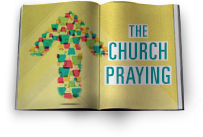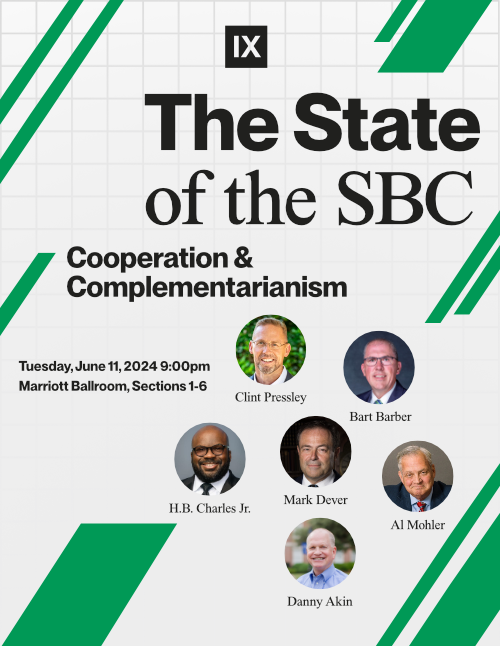Praying the ‘Big Four’ Corporately
We’ve all been a part of churches where prayer is present but neither purposeful nor potent. Unfortunately, prayer in church too often feels like prayer before a meal—it’s obligatory and everyone respects your decision to do it, but no one really gets much out of it. It gets reduced to the best tool to transition from one activity to the next. Let’s have everyone close their eyes and bow their heads, so that transitioning the praise team on and off the stage isn’t as awkward.
Prayer has become the opening act to the headliner—the Sunday sermon. Yet nineteenth-century pastor E. M. Bounds reminds us, “Talking to men for God is a great thing, but talking to God for men is greater still.”
With that in mind, prayer is a big deal for us at Cornerstone, the church I pastor. We don’t want our members and visitors to only hear from God through songs and sermons delivered from the stage. If that were the case, it’d be easy for people to feel like spectators, and that’s not the goal in corporate worship. The goal is services that are both personal and participatory. We want those in attendance to have the opportunity to engage with God relationally, and we see prayer as a critical part of accomplishing that goal.
Everyone gets that we should pray at church. But how you pray makes all the difference, which is why we use corporate prayer as one way to teach our church how to engage with God.
Through this discipline, there are three things we hope take place. First, we want our prayers to address misconceptions; second, we want to pray for things many of us neglect, like praying for government authorities; and third, we want to show that substantial prayer doesn’t have to take a substantial amount of time. A lot can be accomplished in five minutes.
In a nutshell, we’ve learned not to assume that people know how to pray, which is why we specifically include the “Big Four” when we gather together.
ADORATION
Adoration sets the foundation for our time with God. We want to establish in hearts and minds that it is an absolute honor to speak with God. Most of us are so familiar with prayer that we approach God flippantly. From the outset of our service, we want to nip that in the bud.
Instead, we want to be reminded of God’s majestic character—who he is and what he’s done in Christ for the undeserving. Because of Jesus’ great sacrifice, we can boldly approach God. But prayers of adoration also reminded us that we must come to him humbly.
CONFESSION
If we’re doing adoration right, then confession becomes a reflex of the soul, the logical next step. As we reflect on God’s holiness, our sinfulness becomes apparent, and so we are led into confession.
It’s our hope that as we hear a member of our church family confess sin, we will think to ourselves, “Me too.” We often minimize sin in our lives, but as we hear others confess, we’re encouraged to search our hearts and uncover sins we’d overlooked. This doesn’t lead us to despair, but to dependence and joy because in these moments we’re especially reminded of God’s faithfulness and goodness (1 John 1:9).
Confession done correctly elicits worship. However, because it challenges us to explore the darkness of our lives, we too often forsake it and miss out on experiencing the joy God provides. To be sure, any prayer of confession should be serious and remorseful, but the time should always end in rejoicing, like David in Psalm 32:
Blessed is the one whose transgression is forgiven,
whose sin is covered.
Blessed is the man against whom the Lord counts no iniquity,
and in whose spirit there is no deceit.
THANKSGIVING
We all recognize God’s omnipotence. But if we’re not careful, this recognition can undermine our desire to worship God with our heartfelt thanksgiving.
There’s a lot of stuff in this world that’s broken, stuff we want God to fix. Nonetheless, as Christians we know gratitude is often the best antidote to grumbling. In our Sunday gatherings, using a specific time to thank God for who he is and what he does is vital. After all, a broken and downtrodden spirit can be a great obstacle to hearing God’s gracious words to us (Ex. 6:9). So, in our prayers of thanksgiving, we want to remind one another to be grateful—and sometimes we need someone else to point us in that direction. In short, we desire to be aware of the ills of the world, yet not blinded to God’s goodness—that we’d be, as Paul says, appropriately sorrowful yet always rejoicing (2 Cor. 6:10).
SUPPLICATION
While church members lead us in prayers of adoration, confession, and thanksgiving, as pastors, we’ve decided to take the lead in our prayers of supplication. We want to broaden the horizon of what our congregation and community believe they can ask of God.
People are generally pretty narrow in how they engage with God. When they think of prayer, they usually think of just asking God for things. We hope to address that in the ways we use the aforementioned prayers.
Similarly, I’ve found people tend to be pretty narrow even in the things they ask of God. We want to communicate clearly that it’s okay to ask God for a sick person’s healing, it’s okay to pray the same prayer, and it’s okay to ask God for things without phrases like “if it’s in your will.” Of course, following Jesus in the Lord’s Prayer, we desire God’s will to be done above all else.
But sadly, many of us doubt God’s ability and desire to do great things in our lives. As a church, we want to put the greatness of Jesus on display by asking for big things in his name! The beauty in this is that sometimes God answers “NO”—and so we get to grow together as a family, trusting God along the way. On the other hand, sometimes God goes above and beyond what we could ask or imagine; he answers “YES”—and so our faith is strengthened.
As a church, we want worship to be congregational, not privatized; we want women and men to lead in our worship in ways the Bible advocates, and we want to showcase a variety of God’s people speaking to God in various ways.
All of this is made possible because corporate prayer is a key aspect of our Sunday gathering. Our community and even visitors can see themselves in the person that prays while being reminded that significant prayer can happen in various forms in a short period of time. And because we include elements of adoration, confession, thanksgiving, and supplication in our gathering, we have an opportunity to show the emotional breadth that should be a part of a relationship with God.
CONCLUSION
When you’re speaking to a waiter at a restaurant, you simply present requests. If you’re in the presence of someone you admire, you primarily heap compliments on them. Both responses speak to a shallow relationship. But God wants a deep relationship with his people—and the deeper the relationship, the more varied the communication.








